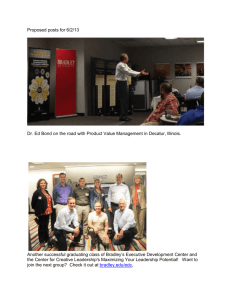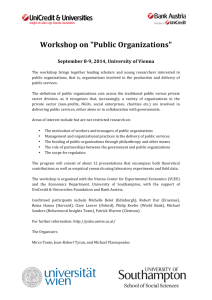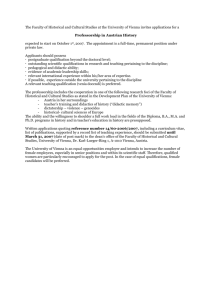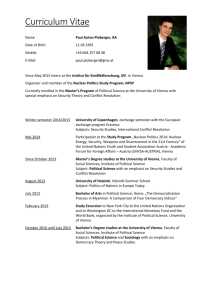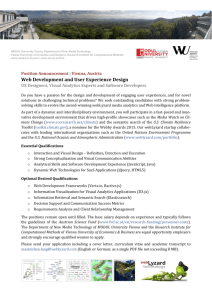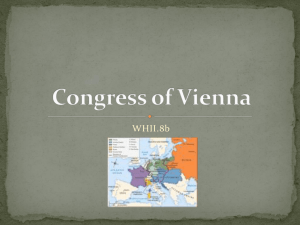Aims of this class
advertisement
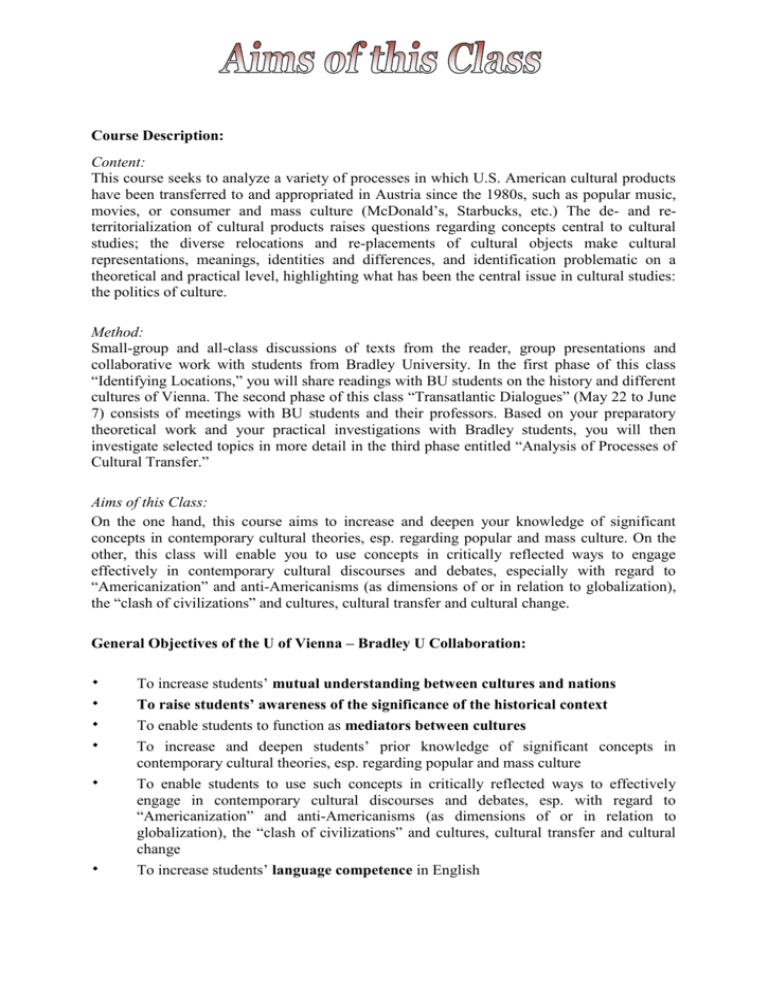
Course Description: Content: This course seeks to analyze a variety of processes in which U.S. American cultural products have been transferred to and appropriated in Austria since the 1980s, such as popular music, movies, or consumer and mass culture (McDonald’s, Starbucks, etc.) The de- and reterritorialization of cultural products raises questions regarding concepts central to cultural studies; the diverse relocations and re-placements of cultural objects make cultural representations, meanings, identities and differences, and identification problematic on a theoretical and practical level, highlighting what has been the central issue in cultural studies: the politics of culture. Method: Small-group and all-class discussions of texts from the reader, group presentations and collaborative work with students from Bradley University. In the first phase of this class “Identifying Locations,” you will share readings with BU students on the history and different cultures of Vienna. The second phase of this class “Transatlantic Dialogues” (May 22 to June 7) consists of meetings with BU students and their professors. Based on your preparatory theoretical work and your practical investigations with Bradley students, you will then investigate selected topics in more detail in the third phase entitled “Analysis of Processes of Cultural Transfer.” Aims of this Class: On the one hand, this course aims to increase and deepen your knowledge of significant concepts in contemporary cultural theories, esp. regarding popular and mass culture. On the other, this class will enable you to use concepts in critically reflected ways to engage effectively in contemporary cultural discourses and debates, especially with regard to “Americanization” and anti-Americanisms (as dimensions of or in relation to globalization), the “clash of civilizations” and cultures, cultural transfer and cultural change. General Objectives of the U of Vienna – Bradley U Collaboration: To increase students’ mutual understanding between cultures and nations To raise students’ awareness of the significance of the historical context To enable students to function as mediators between cultures To increase and deepen students’ prior knowledge of significant concepts in contemporary cultural theories, esp. regarding popular and mass culture To enable students to use such concepts in critically reflected ways to effectively engage in contemporary cultural discourses and debates, esp. with regard to “Americanization” and anti-Americanisms (as dimensions of or in relation to globalization), the “clash of civilizations” and cultures, cultural transfer and cultural change To increase students’ language competence in English Possibilities for contact of U of Vienna students and Bradley students will be the following: a) Before the collaboration in May/June You will share readings and assignments with BU students via e-mail and the elearning platform. b) May 22-June 7 2008 In the Dept. of English and American Studies at the University of Vienna - A lecture by Professor Tim Conley - May 27 class meeting (discussion of the nature, terms, and methods of collaboration) - Poster Presentation and Reception for Bradley students (representatives of the University of Vienna, the U.S. Embassy, and Fulbright Commission will be invited) Explorations of Vienna: Ethnographic analysis of “American” cultural exchanges in Austria The idea is that you get together with the BU students both informally as well as formally (i.e. you participate in their classes and activities). Here is a list of events/activities/classes in which you can participate: Menu of options for collaborative explorations of Vienna Number in brackets = slots available for University of Vienna students; Bradley students will be assigned event by individual instructors. With the exception of the day trips to Mauthausen and Schlaining, each of the following weekday afternoons is available for University of Vienna/Bradley group explorations of Vienna (e.g., cafes, museums, churches, musical events). Inner City Walking Tours—Friday 23 May & Saturday 24 May, afternoon; 3 for each of 12 Bradley group [36 total]; City Bus Tour—Sunday 25 May, 1:00-3:00 with stops at Schönbrunn, Hundertwass Haus [35]—advance notice necessary Mauthausen—Wednesday 28 May, 7:45-7:00: visit to Nazi work/death camp [3-5]—advance notice necessary Vienna Cafes—afternoons: 3 for each of 10 Bradley groups [30] Vienna Museums—afternoons: 3 for each of 10 Bradley groups [30] Vienna’s Religious Sites—afternoons: 3 for each of 10 Bradley groups [30] Musical Events—afternoons: concerts, opera, etc; 3 for each of 10 Bradley groups [30] Participation in COM 103 class, mornings, 8:30-11:00: 3 each for 2 meetings [6] Participation in BMA Human Resources class:, mornings, 8:30-11:00 3 each for 2 meetings [6]—possibly includes site visits Excursion to European Peace University (Schlaining)—Thursday, 5 June, 7:45-10:00 3-5]—advance notice necessary You are expected to complete all reading assignments, be ready to answer questions, and contribute to class discussion. You are expected to participate in the BU-U of Vienna transatlantic dialogues. Participation in the cultural exchange is obligatory! If you are not here from May 22 to June 7, then you cannot participate in this class. You have to hand in a folder (see below). THIS FOLDER IS DUE on JULY 1, (6 pm) University policy requires that we take attendance at the beginning of every class and that you may not be absent more than three times. More than three absences (without a medical statement) will be sufficient grounds for failure in the course. Your final folder will include: a) short assignments (6 tasks that you will be given in class) b) journal-like responses c) a final project Ad a) Assignments: These tasks will be assigned in class and posted on the e-learning platform. We will talk about these assignments in class (group work) and you will share these assignments with the BU students. Ad b) Journal: This is the creative part of your folder (like a journal in which you informally jot down information): Write about and reflect upon the class readings, class conversations and conversations with BU students and jot down other observations and comments. Ad c) Final project: Length: 4-5 pages (typed, line spacing 1,5). Write an ethnographic ESSAY (this essay has to be formal and you have to quote correctly when you cite sources!). You may choose your own topic and you may write on any issue that is related to aspects of inter- and intra-cultural relations between Austria and the U.S. It is important that your project addresses the processes of cultural transfer and transatlantic dialogue. You may either focus on the politics of culture and the various appropriations of “American” culture in Austria (e.g. Starbucks, McDonalds, etc.). You could also analyze diverse forms of Anti-Americanisms in the media; you could analyze stereotypes in the media; you could also pick a historical topic and write about the different ways in which “history” is remembered differently (e.g. a comparison of Holocaust memorials); you could also write about your experiences of the mediation of culture and the culture of mediation. Depending on the type of project you will choose, you can incorporate interviews with BU students, your observations when you walked with them through Vienna, or your responses to your interaction with each other. You will also have to do some research to back up your argument (especially should you choose to write on a historical topic, you need to frame your argument in historical terms). In this project you should reflect upon the terms of this class: how has the dialogue with BU students affected you; how has the encounter with BU students shaped your project? It is also important that you show that you are aware of your own location as a researcher. Please make sure that in writing your essay you use the terms and concepts introduced in your reader. If you quote from the reader, you need to state your source: e.g. As Reinhold Wagnleitner states in Coca-Colonialization, “quote” (page number) or: According to Reinhold Wagnleitner, … If you can’t find the original page, refer to the page number of the reader. The goal and focus of this course is the critical application of significant concepts in contemporary cultural theories to concrete examples of processes of cultural transfer. Therefore, in your assignments in your final project you should demonstrate that you are able to engage effectively in contemporary cultural discourses and debates, esp. with regard to “Americanization” and anti-Americanisms. We will therefore evaluate the following criteria: a) demonstration of grasp of the theoretical concepts dealt with in class and in the readings; b) self-sufficient application of these concepts in the analysis of concrete examples; and c) ability of critical reflection on the concepts, theories, methods, and examples dealt with in the course. These criteria will be evaluated in all tasks and assignments of your folder! As this is a course in the Department of English, your command of the English language will be part of your evaluation, too. We will especially evaluate grammatical correctness, clarity of expression, structuring of ideas and arguments, and appropriateness of register. Grading policy: Class participation; participation in two-week student exchange with BU students; poster presentation of collaborative work with BU students: 30 % Written assignments in folder: 30 % Final project (in folder): 40 %
